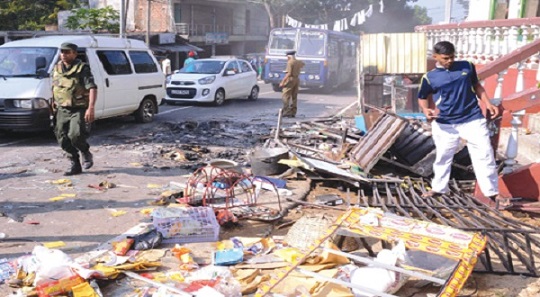KANDY – As Muslims worldwide perform their Friday prayer in peace, Sri Lanka Muslims fear being attacked during prayers, amid accusations that security forces are failing to take action against marauding mobs.
“I am living in fear and could not sleep the whole night as all the men from my family have gone out to protect us and we are left in the home,” Fathima Rizka, a 25-year-old from Kandy, told Al Jazeera.
“The police are not protecting us. They are just standing by while more attacks are being carried out … We don’t know what will happen next.”
Violence broke out last weekend between Muslims and Buddhists in the central district of Kandy when a man from the mainly Buddhist Sinhalese majority was beaten to death by Muslim men over a traffic accident.
The following day, hundreds of Sinhala Buddhists converged on the district and attacked dozens of Muslim businesses, setting Muslim houses and mosques on fire.
Rizka said that the Muslim community in Kandy are gripped with fear that Buddhists are planning attacks in the area during Friday prayers.
“Special arrangements are being made by the community to ensure that there are men who will pray at a different time to ensure that women and children are not left vulnerably alone in their homes,” she said.

Attacks Continue
Despite a state of emergency and a curfew, concerns abound that attacks will continue in Sri Lanka.
“The government is saying that they will do more to crack down against the mobs, but the truth on the ground is that Muslims do not feel protected,” said Mohamed, 58, who asked that his surname not be published for security reasons.
“We feel that there is someone involved in a high position who is enabling the mobs to get away with the crimes against our community.”
Mohamed added that the Muslim residents were taking security matters into their own hands.
“We cannot let our wives, mothers, and sisters cry in fear, watching our livelihoods burn before our eyes while those in authority refuse to sincerely help us,” he said.
“We have to take matters into our own hands by standing outside our properties and in our towns to ensure the safety of our families, because the police are simply not keeping law and order intact.”
Religious and ethnic violence can turn deadly in Sri Lanka, where Muslims account for 10 percent of the population and Buddhists Sinhalese make up nearly 75 percent.
An anti-Muslim campaign was launched following the deadly Aluthgama riots in June 2014.
When he came to power in 2015, President Maithripala Siresena vowed to investigate and tackle the rise of anti-Muslim crimes, but no significant progress has been reported.